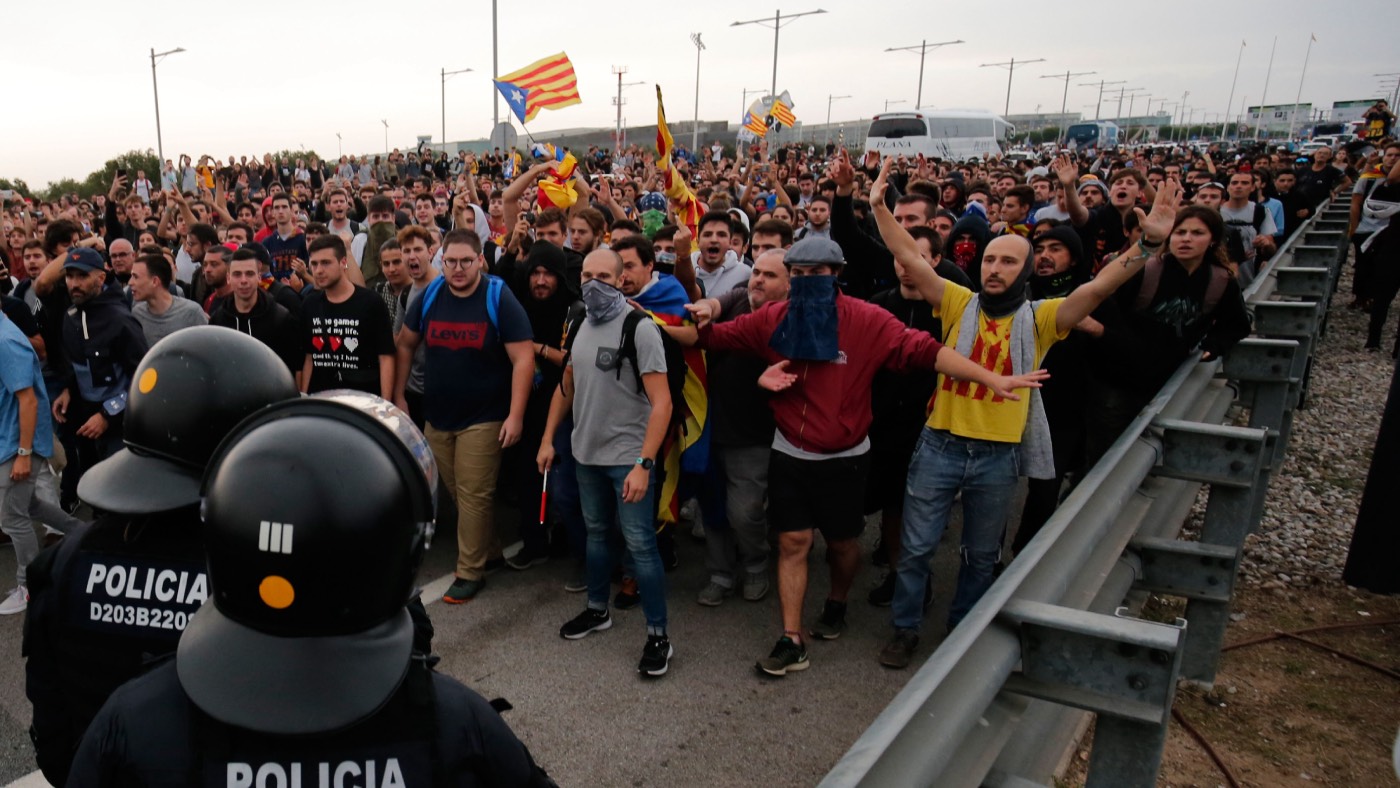Why has Spain jailed Catalan leaders?
Unrest after independence leaders handed lengthy sentences in Spanish ‘trial of the century’

A free daily email with the biggest news stories of the day – and the best features from TheWeek.com
You are now subscribed
Your newsletter sign-up was successful
Spain's Supreme Court has sentenced nine Catalan leaders who organised an unauthorised independence referendum to between nine and 13 years in prison.
The longest sentence was handed down to Oriol Junqueras, Catalonia's former vice president, who was found guilty of misuse of public funds and sedition.
As well as the nine jailed leaders, three other defendants were found guilty of disobedience and fined, but will not serve prison sentences.
The Week
Escape your echo chamber. Get the facts behind the news, plus analysis from multiple perspectives.

Sign up for The Week's Free Newsletters
From our morning news briefing to a weekly Good News Newsletter, get the best of The Week delivered directly to your inbox.
From our morning news briefing to a weekly Good News Newsletter, get the best of The Week delivered directly to your inbox.
Catalan President Quim Torra called yesterday’s sentences as an “act of revenge, not of justice”, and described the defendants as “honorable and peaceful people”. The defendants have already said they will appeal to the European court of human rights.
The 12 politicians and activists had all denied the charges, which relate to their role in the independence referendum held on 1 October 2017 in defiance of the government in Madrid.
At the hearing, which was described as the “trial of the century”, prosecutors argued that leaders had executed a “perfectly planned strategy... to break the constitutional order and obtain the independence of Catalonia” illegally.
Catalonia is a semi-autonomous region in north-east Spain with a distinct culture, traditions and language. Home to around 7.5 million people, it has its own flag, anthem, and pro-independence regional government.
A free daily email with the biggest news stories of the day – and the best features from TheWeek.com
Catalan officials claim more than 90% of people who voted registered a desire to break free from Spain.
The court also issued a European arrest warrant for Catalonia's former president, Carles Puigdemont, who is living in self-imposed exile in Belgium. Writing on Twitter, Puigdemont described the jailings as a “barbarity”.
The BBC says that Catalonia's drive for independence has plunged Spain into its biggest political crisis for 40 years. The region had its autonomy suspended for almost seven months by Madrid after its failed breakaway bid.
Spain’s foreign minister, Josep Borrell, said he hoped the verdict could serve as a means to bring Catalonia’s deeply divided society back together.
He told the Associated Press that work show now start “for a normalisation of the political social life in Spain and to heal the wounds of this Catalan society, but with full respect to the Spanish constitution”.
However, the verdict sparked immediate unrest, as demonstrators took to the streets across the region. Protesters also tried to blockade the main terminal at Barcelona airport. The Guardian says that a group called Tsunami Democràtic encouraged Catalonians to download more than 100,000 fake airline tickets in order to get past police lines.
–––––––––––––––––––––––––––––––For a round-up of the most important stories from around the world - and a concise, refreshing and balanced take on the week’s news agenda - try The Week magazine. Get your first six issues for £6–––––––––––––––––––––––––––––––
-
 Is Andrew’s arrest the end for the monarchy?
Is Andrew’s arrest the end for the monarchy?Today's Big Question The King has distanced the Royal Family from his disgraced brother but a ‘fit of revolutionary disgust’ could still wipe them out
-
 Quiz of The Week: 14 – 20 February
Quiz of The Week: 14 – 20 FebruaryQuiz Have you been paying attention to The Week’s news?
-
 The Week Unwrapped: Do the Freemasons have too much sway in the police force?
The Week Unwrapped: Do the Freemasons have too much sway in the police force?Podcast Plus, what does the growing popularity of prediction markets mean for the future? And why are UK film and TV workers struggling?
-
 How corrupt is the UK?
How corrupt is the UK?The Explainer Decline in standards ‘risks becoming a defining feature of our political culture’ as Britain falls to lowest ever score on global index
-
 The high street: Britain’s next political battleground?
The high street: Britain’s next political battleground?In the Spotlight Mass closure of shops and influx of organised crime are fuelling voter anger, and offer an opening for Reform UK
-
 Is a Reform-Tory pact becoming more likely?
Is a Reform-Tory pact becoming more likely?Today’s Big Question Nigel Farage’s party is ahead in the polls but still falls well short of a Commons majority, while Conservatives are still losing MPs to Reform
-
 Taking the low road: why the SNP is still standing strong
Taking the low road: why the SNP is still standing strongTalking Point Party is on track for a fifth consecutive victory in May’s Holyrood election, despite controversies and plummeting support
-
 What difference will the 'historic' UK-Germany treaty make?
What difference will the 'historic' UK-Germany treaty make?Today's Big Question Europe's two biggest economies sign first treaty since WWII, underscoring 'triangle alliance' with France amid growing Russian threat and US distance
-
 Is the G7 still relevant?
Is the G7 still relevant?Talking Point Donald Trump's early departure cast a shadow over this week's meeting of the world's major democracies
-
 Angela Rayner: Labour's next leader?
Angela Rayner: Labour's next leader?Today's Big Question A leaked memo has sparked speculation that the deputy PM is positioning herself as the left-of-centre alternative to Keir Starmer
-
 Is Starmer's plan to send migrants overseas Rwanda 2.0?
Is Starmer's plan to send migrants overseas Rwanda 2.0?Today's Big Question Failed asylum seekers could be removed to Balkan nations under new government plans